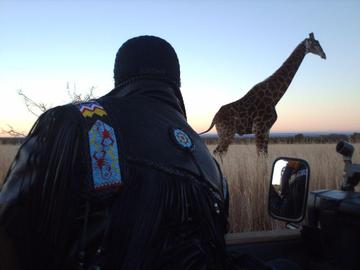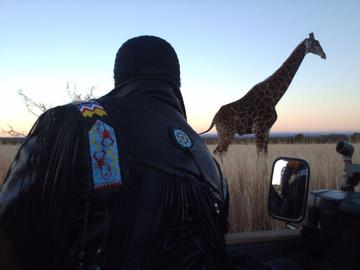 A friend of mine, a fellow Young Global Leader by the name of Peter Bisanz, told me recently that "the poor have found a dignity in their poverty, that the rich has seemed to have lost in their affluence." Truer words have seldom been said.
A friend of mine, a fellow Young Global Leader by the name of Peter Bisanz, told me recently that "the poor have found a dignity in their poverty, that the rich has seemed to have lost in their affluence." Truer words have seldom been said.
This was my experience during the past year, traveled back and forth to mother South Africa as we made plans to launch our first office of HOPE Global Initiatives, Banking on Our Future, South Africa.
I remember the first time I checked into a South African hotel, and how the Black African men and women there looked at me — the only way to describe it was pride, …pure pride. Their eyes were saying what their mouths could not, on the clock, "go on man, do your business, and make us proud too." Now, this goes against the grain of the perception that African Americans have of our African brothers and sisters, and their feelings about us. You have to come here for yourself to see what and feel what I experienced — and that is a profoundly positive and "connected" experience with everything African.
 I remember going for the first time into a South African university to give a speech, before a mixed audience of whites, blacks and colored students (I will get back to this distinction in South Africa between races a little later), and being introduced as "John Hope Bryant from the United States." The second time it happened, at the next college I was scheduled to speak at, where the audience was all Black Africans, I remember having enough confidence to say in response, "no, actually I am John Hope Bryant, who lives in the United States, and I am proud of that fact, but I am from mother Africa. Thank you very much." I made sure to make that distinction each and every time I was introduced at every speaking engagement, before every sort of audience, from then on out.
I remember going for the first time into a South African university to give a speech, before a mixed audience of whites, blacks and colored students (I will get back to this distinction in South Africa between races a little later), and being introduced as "John Hope Bryant from the United States." The second time it happened, at the next college I was scheduled to speak at, where the audience was all Black Africans, I remember having enough confidence to say in response, "no, actually I am John Hope Bryant, who lives in the United States, and I am proud of that fact, but I am from mother Africa. Thank you very much." I made sure to make that distinction each and every time I was introduced at every speaking engagement, before every sort of audience, from then on out.
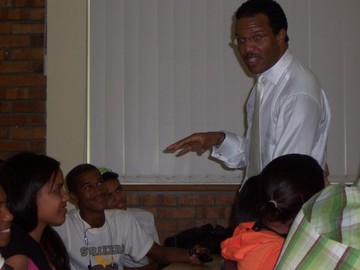 Or the time I was talking to a Black African as he described me as "colored," and I immediately responded with disgust, "no, I am black," only to have him restate with emphasis this time… "no, you are colored my good friend." Well, in my heart, mind and spirit I am a proud black African, but colored does probably better describe my ethnicity, at least in South Africa. You see, in South Africa you have historically had three distinct groups, legally classified during Apartheid, and they were, in the order of legal privilege, (1) whites, (2) colored (anyone of mixed race, but mostly those of Indian ancestry, meaning from India) and (3) Black Africans. Black Africans make up approximately 80% of the population in South Africa today, and most of her poor. Mixed race or not (thanks to the complicated and unfortunate legacy of slavery in America), I stand proudly with Black Africans, and against no other race, as Operation HOPE seeks to "lift as we rise" in mother South Africa. In other words, what Black Africans need today, more than money, land and opportunity itself, is dignity. This, I offer first.
Or the time I was talking to a Black African as he described me as "colored," and I immediately responded with disgust, "no, I am black," only to have him restate with emphasis this time… "no, you are colored my good friend." Well, in my heart, mind and spirit I am a proud black African, but colored does probably better describe my ethnicity, at least in South Africa. You see, in South Africa you have historically had three distinct groups, legally classified during Apartheid, and they were, in the order of legal privilege, (1) whites, (2) colored (anyone of mixed race, but mostly those of Indian ancestry, meaning from India) and (3) Black Africans. Black Africans make up approximately 80% of the population in South Africa today, and most of her poor. Mixed race or not (thanks to the complicated and unfortunate legacy of slavery in America), I stand proudly with Black Africans, and against no other race, as Operation HOPE seeks to "lift as we rise" in mother South Africa. In other words, what Black Africans need today, more than money, land and opportunity itself, is dignity. This, I offer first.
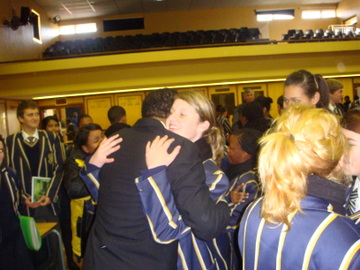 And dignity was exactly what I had in mind as my message two weeks ago when I addressed a "model C school" called Hugenote High School in Wellington, about 45 minutes outside of Cape Town, South Africa. A Model C School is code word for an exclusively white only school during Apartheid. Well, today this school is 25% non-white and a recent widely reported girl-on-girl fight on campus, between a white and a black, was not in fact about race; and that’s a good thing. The kids at Hugenote are blessed in every way, and seem to be getting along together in this 13-year old experiment called the new South Africa, but more is expected of them still. You see, this group of 900 or so students I spoke with will be the leadership elite of South Africa’s future, leading its business class, society, and politics, and it is not alright if they are only concerned about themselves. They must be leaders of and for a new South Africa, and in some cases, no, in many cases, that will mean believing and behaving in many ways contrary to how their parents and grandparents believed, and behaved. It means extending dignity to everyone, poor Black Africans included, because you cannot have dignity until you offer it first. And because South Africa will have no future at all if it continues to have a poor underclass representing 90% of the population, who do not feel they have a stake in their country, or its future. The riots in Paris, France happened because the blacks and other poor in the suburbs of France only felt French when they paid their taxes, but never saw themselves represented or reflected in French business, politics or high society. The stakes are much higher in South Africa, and everyone needs to commit themselves to becoming part of the solution. The miracle — they are.
And dignity was exactly what I had in mind as my message two weeks ago when I addressed a "model C school" called Hugenote High School in Wellington, about 45 minutes outside of Cape Town, South Africa. A Model C School is code word for an exclusively white only school during Apartheid. Well, today this school is 25% non-white and a recent widely reported girl-on-girl fight on campus, between a white and a black, was not in fact about race; and that’s a good thing. The kids at Hugenote are blessed in every way, and seem to be getting along together in this 13-year old experiment called the new South Africa, but more is expected of them still. You see, this group of 900 or so students I spoke with will be the leadership elite of South Africa’s future, leading its business class, society, and politics, and it is not alright if they are only concerned about themselves. They must be leaders of and for a new South Africa, and in some cases, no, in many cases, that will mean believing and behaving in many ways contrary to how their parents and grandparents believed, and behaved. It means extending dignity to everyone, poor Black Africans included, because you cannot have dignity until you offer it first. And because South Africa will have no future at all if it continues to have a poor underclass representing 90% of the population, who do not feel they have a stake in their country, or its future. The riots in Paris, France happened because the blacks and other poor in the suburbs of France only felt French when they paid their taxes, but never saw themselves represented or reflected in French business, politics or high society. The stakes are much higher in South Africa, and everyone needs to commit themselves to becoming part of the solution. The miracle — they are.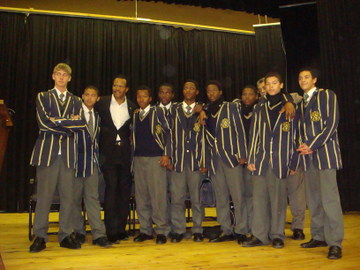
At the end of my speech at Hugenote High School something, no many things profound happened to me. You see, I had given them all a pretty tough message, starting out by saying they should all be "ashamed of themselves (if they didn’t to do more than be successful themselves)." And by the end of a 50 minute talk, I was not sure exactly what response I would get. Neither did the principal, who had attended the school as a child and worked there since — meaning straight through the Apartheid period.
Hello. But as I wrapped up my remarks and headed for my chair, a rumble of applause erupted behind me, and I turned around to see a standing ovation — by white, black and colored kids alike. Touching, but then as I walked down into the crowd to shake a couple of hands and take a couple of pictures things got even more interesting. The kids didn’t leave. They didn’t, it seems, want to leave. Many stayed to shake my hand, and more than a few young people, all of them white interestingly enough, actually asked me for a hug. Wow…. You cannot imagine what a big deal this is, in a former "class C model school" in post Apartheid South Africa. More was done in building positive race relations in and for mother South Africa in that one hour than can be recounted in this piece.
But then came the mind blower of all mind blowers, as a young male white youth approached me, with tears welling up in his eyes. He told me that the speech touched him deeply, and that the spirit that surrounded it, about a united South Africa made by him and his classmates, profoundly changed him. He took off his peace bracelet, and asked if he could give it to me. I was without words…as this young white man placed a peace bracelet around the wrist of this young African-American man — with all the love and care he had available in his heart. I vowed to wear it from that day on…and I have. 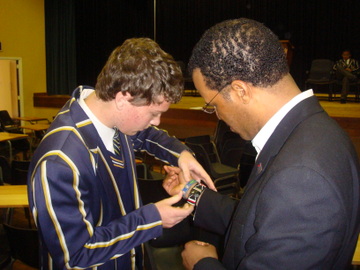
And the stories go on, and on, and on. All positive. All uplifting. All making me believe in the future of South Africa more, not less. I feel we can make a difference here. That is why we have made a commitment to educate 50,000 youth, and women (thank you MEC Angelina Motshekga) in financial literacy, dignity and entrepreneurship over the next 5 years in South Africa, through Banking on Our Future, South Africa.
That is why we are partnering with Citi, IFC of the World Bank, Standard Bank, CIDA University, the MEC’s for the Western Cape Cameron Dugmore and for the Qauteng Province Angelina Motshekga, and the Nelson Mandela Children’s Fund, along with a host of others to make it happen. That is why I have asked my friend Herman Bailey, the former mayor of Wellington and the reason I ended up at Hugenote High School, and with an office commitment in and for Wellington, to chair our founding regional board for the Western Cape. That is why I have asked Thierry Tanoh of IFC (the International Finance Corporation of the World Bank) to chair our founding board in the Qauteng Province, and why I have asked my original inspiration for South Africa, my friend Sean Cleary, an advisor to the World Economic Forum, to chair our soon to be announced HOPE Global Board of Advisors. That is why I have listened closely to the wise and caring counsel offered by my new friend Mampe of the Nelson Mandela Children’s Fund, our new partner countrywide in South Africa, and why we have made a significant, long-term commitment to mother South Africa.
Because South African and Rwanda have moved boldly and courageously from Apartheid and Genocide, to peace and prosperity in 13 short years. Amazing, and all accomplished within the spirit and context of peace and reconciliation. The leaders in both countries realized early on that "an eye for an eye" simply leaves everyone blind.
If they can do this, alone, what can they accomplish with the hope and the resources of the developed world behind them?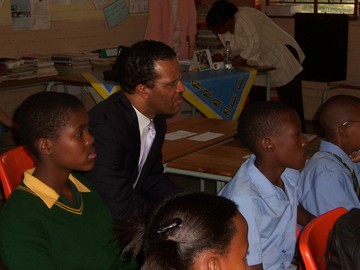
I for one will be right there with them both (South Africa and Rwanda), helping to provide the quiet wind beneath their already proud, beautiful and capable sails.
Our goal — simply to help South Africa help itself. How, quoting my hero and our global spokesman Ambassador Andrew Young, the senior aide to the late Dr. Martin Luther King, Jr. in the civil rights movement and one who accompanied me for the launch of Banking on Our Future, South Africa, at his own expense and on his own time, "…our goal has to be nothing short of making capitalism and free enterprise relevant to the poor. To make capitalism and free enterprise finally work for the poor." …To help South Africa fix, once and for all, its own "Jericho Roads."
And the good news is progress is already well under way in the new South Africa, with the black middle class growing by a remarkable 30% last year, now accounting for 12% of the South African population. Now this is hope made real.
This we can do.
Let’s go….
Onward, with HOPE
John Hope Bryant

